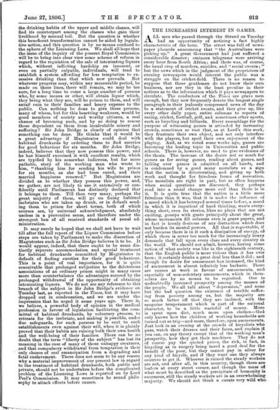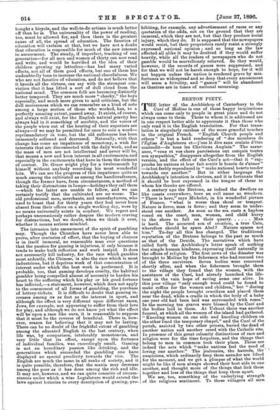THE INCREASING INTEREST IN GAMES. A LL men who passed through
the Strand on Tuesday had an opportunity of noticing a fact highly characteristic of the hour. The street was full of news- paper placards announcing that "the Australians were picking up." A great Government had just suffered a considerable disaster; ominous telegrams were arriving every hour from South Africa; and there was, of course, the usual crop of murders, suicides, and " social events ; but the news which in the judgment of the proprietors of evening newspapers would interest the public was ar struggle on the cricket-field. There is no reason to- suppose that these gentlemen do not know their own- business, nor are they in the least peculiar in their notions as to the information which it pays newspapers to- circulate. The conductors of the Times are grave men enough, but they now frequently devote the longest single paragraph in their jealously compressed news of the day to a statement of cricket events, and they give up, like every other daily paper, entire columns to reports o$ racing, cricket, football, golf, and sometimes other sports, such as bicycling and billiards. Every assemblage for the- purpose of witnessing games is attended by increasing crowds, sometimes so vast that, as at Lord's this week, they frustrate their own object, and not only interfere• with the players, but spoil their own enjoyment of the. playing. And, as we noted some weeks ago, games are- becoming the leading topic in Universities and public- schools. There is, however, no need to give evidences of the thesis. The increase of the desire not so much for- games as for seeing games, reading about games, and talking over games is admitted on all hands, and is condemned by a good many moralists as a sign that the nation is deteriorating, and giving up both. work and thought for frivolous forms of recreation: The moralists are right in part, but as often happens when social questions are discussed, they perhaps read into a social change more evil than there is in it. It is quite true that the nation is a little more frivolous than it was, that it is under the influence of a mood which it has betrayed several times before, a mood in which it is impatient of hard thinking, wants every- thing short, even its stories, likes no plays that are not exciting, gossips with gusto principally about the great,. whose movements fill columns even in grave papers, and' in fact is keenly desirous of any distraction which does not burden its mental powers. All that is regrettable, if only because there is in it such a dissipation of energy, of which there is never too much for the increasingly heavy demands that fall upon every class and every country in the world. We should not admit, however, having some notion of what society was like in the eighteenth century, that the English public is more vicious than it has ever been; it certainly drinks a great deal less than it did ; and though its desire for amusement has increased, the kind of amusement is almost infinitely less barbaric. There are causes at work in favour of amusements, and especially of non-sedentary amusements, which in them- selves are by no means to be regretted. One is undoubtedly increased prosperity among the masses of the people. We all talk about " depression," and none but the bad question the existence of terrible suffer- ing from poverty among us, but the majority are so much better off that they are inclined, with the sanguine temperament which is part of the national, character, to be a little wasteful of money. More is spent upon diet, much more upon clothes—God only knows how the children of working households are turned out so trig—and more, therefore, upon amusements. Just look in an evening at the crowds of bicyclists who pass, watch their dresses and their faces, and explain if you can, on any theory except that of the working man's prosperity, how they get their machines. They do not of course pay the quoted prices, the rich, in fact, in bicycling as in surgery being taxed a good deal for the benefit of the poor, but they cannot pay in silver for any kind of bicycle, and if they want one they always contrive to get it. Whoever is ruined the steady workers are not, and after all, in this country, though there are loafers at every street corner, and though the mass of what must be described as the precipitate of humanity is enormous, still the steady workers are in an overwhelming majority. We should not think a curate very wild who bought a bicycle, and the well-to-do artisan is much better off than he is. The universality of the power of reading, too, must be allowed for, and then there is the greatest cause of all, the spread of education. The fanatics of education will exclaim at that, but we have not a doubt that education is responsible for much of the new interest. in amusement. The steady, if imperfect, teaching of one generation—for all men and women of thirty can now read and write, and would be horrified at the idea of their children growing up letterless—has had many varied effects, not all of them good effects, but one of them has undoubtedly been to increase the national cheerfulness. We who are not fanatics of education, and do not believe that it breeds all the virtues, can say with the strongest con- viction that it has lifted a sort of dull cloud from the national mind. The common folk are becoming distinctly better tempered. They are much more " cheeky," the boys especially, and much more given to acid criticism, but the dull moroseness which we can remember as a kind of note among a large section of those who worked, has, to a perfectly amazing extent, passed away. It exists, of course, and always will exist, for the English natural gravity has always had in it something of acerbity, and the voices of the people when out of the hearing of their superiors are always—if we may be permitted for once to coin a word- reprimandatory in tone, but the old sullenness has been immensely softened and decreased. Naturally, with that change has come an impatience of monotony, a wish for interests that are disconnected with the daily work, and as the mass of men are not intellectual and never will be, that means a new and keen interest in all excitements, and especially in the excitements that have in them the element of contest. Dr. Grace might play for a twelvemonth by himself without anybody recording his most wonderful hits. We can see the progress of this impatience quite as much among the cultivated as among the handicraftsmen, though the former have, from circumstances, a method of taking their distractions in lumps—holidays they call them —which the latter are unable to follow, and we can certainly testify that the cultivated are no worse. The old professional men, merchants, and manufacturers, who used to boast that for thirty years they had never been absent from their offices on a single working day, were by no means universally saints in conduct. We regret and perhaps unconsciously rather despise the modern craving for distractions, but we doubt, when we think it over, whether it means serious mischief.
The intrusion into amusement of the spirit of gambling may. Though the Churches have never been able to prove, after centuries of effort, that the buying of chances is in itself immoral, no reasonable man ever questions that the passion for gaming is injurious, if only because it tends to make both reflection and work insipid. It does not necessarily kill industry, for the race which gambles most ardently, the Chinese, is also the race which is most industrious, but it deprives work of that concentration of interest under which the best work is performed. It is probable, too, that gaming develops cruelty, the habitual gambler being compelled almost of necessity to harden his heart to the suffering which his play or his good fortune has inflicted,—a statement, however, which does not apply to the commonest of all forms of gambling, the purchase of lottery-tickets. It is difficult to doubt that gaming in- creases among us as fast as the interest in sport, and although the effect is very different upon different races, Jews, for example, not appearing to suffer from their love for play, and although we do not know yet what the effect will be upon a race like ours, it is reasonable to suppose that it must be the reverse of beneficial. There is, how- ever, reason for believing that it may not be lasting. There can be no doubt of the frightful extent of gambling among the educated English in the last century, when life was, by comparison, intolerably monotonous, and very little that its effect, except upon the fortunes of individual families, was exceedingly small. Gaming is not an hereditary passion like drinking, and the generations which succeeded the gambling one have displayed no special proclivity towards the vice. The English are much the same in all ranks of society, and it is quite possible, therefore, that the mania may decrease among the poor as it has done among the rich and idle. It may not, however, and we can quite conceive of circum- stances under which a wise Legislature would extend the laws against lotteries to every description of gaming, pro- hibiting, for example, any advertisement of races or any quotation of the odds, not on the ground that they are immoral, which they are not, but that they produce social injury, which they do. It is supposed that the newspapers would resist, but their proprietors rarely resist a strongly expressed national opinion ; and so long as the law affected,all alike it may be doubted if they would suffer heavily, while all the readers of newspapers who do not gamble would be marvellously relieved. So they would, however, if the records of games were suppressed, and for that we will not be harsh enough to hope, for it will not happen unless the nation is rendered grave by mis- fortunes so widespread and so deep that every amusement will seem a frivolity, and " games " will be abandoned as theatres are in times of national mourning.

















































 Previous page
Previous page